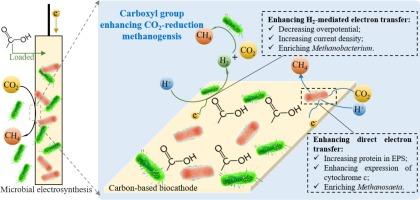增强微生物电合成中的二氧化碳还原甲烷生成:碳基阴极上含氧基团的作用。
IF 9.7
1区 环境科学与生态学
Q1 AGRICULTURAL ENGINEERING
引用次数: 0
摘要
微生物电合成是从废水中回收能量,同时将 CO2 转化为 CH4 的一项前景广阔的技术。构建一个同时具有强大的 H2- 媒介能力和直接电子传递能力的生物阴极,对于高效启动和长期稳定地生产 CH4 至关重要。本研究发现,在阴极上引入羧基可有效增强这两种电子传递途径,从而提高 CH4 生产的还原率和库仑效率,并将 CH4 产量提高 2-3 倍。羧基降低了 H2 演化的过电位,提高了电流密度,从而增强了以 H2 为媒介的电子传递。此外,羧基还能使甲烷菌的相对丰度提高 3%-10%,使细胞外聚合物质中的蛋白质含量增加一倍,并促进细胞色素 c 相关基因的表达,从而提高直接电子传递能力。这些发现为构建稳定、高性能的生物阴极提供了一种新颖、高效的方法,有助于能量回收和二氧化碳固定。本文章由计算机程序翻译,如有差异,请以英文原文为准。

Enhancing CO2-reduction methanogenesis in microbial electrosynthesis: Role of oxygen-containing groups on carbon-based cathodes
Microbial electrosynthesis is a promising technology that recovers energy from wastewater while converting CO2 into CH4. Constructing a biocathode with both strong H2-mediated and direct electron transfer capacities is crucial for efficient startup and long-term stable CH4 production. This study found that introducing carboxyl groups onto the cathode effectively enhanced both electron transfer pathways, improving the reduction rate and coulombic efficiency of CH4 production and increasing the CH4 yield by 2–3 times. Carboxyl groups decreased the overpotential for H2 evolution and increased current density, thereby enhancing H2-mediated electron transfer. Additionally, carboxyl groups increased the relative abundance of Methanosaeta by 3%-10%, doubled the protein content in extracellular polymeric substances, and boosted the expression of cytochrome c-related genes, thereby enhancing direct electron transfer capacity. These findings present a novel and efficient approach for constructing a stable, high-performance biocathode, contributing to energy recovery and CO2 fixation.
求助全文
通过发布文献求助,成功后即可免费获取论文全文。
去求助
来源期刊

Bioresource Technology
工程技术-能源与燃料
CiteScore
20.80
自引率
19.30%
发文量
2013
审稿时长
12 days
期刊介绍:
Bioresource Technology publishes original articles, review articles, case studies, and short communications covering the fundamentals, applications, and management of bioresource technology. The journal seeks to advance and disseminate knowledge across various areas related to biomass, biological waste treatment, bioenergy, biotransformations, bioresource systems analysis, and associated conversion or production technologies.
Topics include:
• Biofuels: liquid and gaseous biofuels production, modeling and economics
• Bioprocesses and bioproducts: biocatalysis and fermentations
• Biomass and feedstocks utilization: bioconversion of agro-industrial residues
• Environmental protection: biological waste treatment
• Thermochemical conversion of biomass: combustion, pyrolysis, gasification, catalysis.
 求助内容:
求助内容: 应助结果提醒方式:
应助结果提醒方式:


